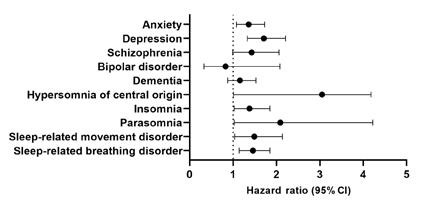
4 minute read
Adrenal adenomas, dementia and psychiatric/sleep disorder risk
from Endocrine Views (ESE News) Spring 2024 (News and Views European Society of Endocrinology) Issue 53
A recent article in European Journal of Endocrinology has examined the relationship between adrenal adenomas and risk of psychiatric and sleep disorders.1
Adrenal adenomas are commonly encountered in clinical practice, with a prevalence of 3−7% in adults undergoing abdominal computed tomography.2−4 Most adrenal adenomas represent non-functioning adrenal adenomas (NFA), but 20−50% of patients demonstrate mild autonomous cortisol secretion (MACS), which is diagnosed based on abnormal post-dexamethasone cortisol (>1.8µg/dl).4 Patients with MACS and NFA have been reported to have an increased likelihood of cardiovascular risk factors and events, fractures, frailty, and mortality.2,4,5 Association of NFA and MACS with cognitive impairment and psychiatric and sleep disorders has been suggested, but scarcely investigated.
Recently, we conducted a population-based study in Olmsted County, MN, USA, to assess the relationship between adenomas and psychiatric and sleep disorders in patients diagnosed with adenomas between 1995 and 2017, and in age- and sex-matched referent subjects. Both patients and referent subjects were followed for a median of 6.8−7.2 years. We assessed the association between adenomas and psychiatric disorders at index date (time of diagnosis with adrenal adenoma). In addition, the study looked at development of new disorders during follow-up. The associations were measured using hazard ratios and 95% confidence intervals (CIs) using Cox regression models for the cohort analyses. Multivariable analysis that included age, sex, socioeconomic status, body mass index, tobacco usage and substance abuse was performed.
Our findings
At index date (baseline), patients presented with higher odds of depression, anxiety and substance abuse compared with referents. However, when adjusted for substance abuse, no association between adenomas and psychiatric and sleep disorders was found.
During a median follow-up of 6.8 years, and after adjusting for age, sex, socioeconomic status, body mass index, tobacco usage and substance abuse, patients demonstrated a higher risk of psychiatric and sleep disorders as follows [adjusted hazard ratio (CI 95%)]: depression [1.7 (1.3–2.2)], anxiety [1.4 (1.1–1.7)], insomnia [1.4 (1.0–1.9)], sleeprelated breathing disorders [1.5 (1.1–1.9)], hypersomnias [2.1 (1.0–4.2)], parasomnias [2.1 (1.0–4.2)] and sleep-related movement disorders [1.5 (1.0–2.1)] (Figure).
No cross-sectional or longitudinal associations between the diagnosis of adrenal adenoma and dementia were found in this study.
Discussion and conclusion
One of the reasons for noted association between adrenal adenomas and risk of psychiatric and sleep disorders is subtle abnormal cortisol production. Based on reported prevalence of adenoma subtypes, patients with adrenal adenomas in this population-based study probably included a mixture of patients with NFA (60−80%) and those with MACS (20−40%).2 Hypercortisolism of various degrees has been recently reported to be associated with several psychiatric disorders, and reported difficulties with sleep.6

Another possible explanation is that a higher burden of co-morbidities and frailty, reported in patients with adenoma in this and previous studies, contributes to development of psychiatric and sleep disorders.1,6 The diagnosis of adrenal adenoma may also be a cause of stress for patients and contribute to anxiety, depression and sleep abnormalities.
The strengths of this study include a population-based design, a relatively long median follow-up of almost 7 years, and adjustment for multiple confounding variables. As participants in this study were predominantly white, the results may not be generalisable to more diverse populations. Another limitation is that classification of patients with adrenal adenomas based on dexamethasone suppression test results was not possible. Additional studies need to stratify the risk based on the degree of autonomous cortisol secretion and examine the impact of adrenalectomy on the reversal of psychiatric and sleep disorders.
Irina BancosMayo Clinic, Rochester, MN, USA
REFERENCES
1. Li et al. 2023 EuropeanJournalofEndocrinology https://doi.org/10.1093/ejendo/lvad135
2. Bancos & Prete 2021 JournalofClinicalEndocrinology&Metabolism https://doi.org/10.1210/clinem/dgab512
3. Ebbehoj et al. 2020 LancetDiabetes&Endocrinology https://doi.org/10.1016/S2213-8587(20)30314-4
4. Fassnacht et al. 2023 EuropeanJournalofEndocrinology https://doi.org/10.1093/ejendo/lvad066
5. Pelsma et al. 2023 EuropeanJournalofEndocrinology https://doi.org/10.1093/ejendo/lvad134
6. Dogra et al. 2023 EuropeanJournalofEndocrinology https://doi.org/10.1093/ejendo/lvad113
Insights from the Editor
This study presents both interesting and challenging results, suggesting an increased risk of sleep and psychiatric disorders in patients with adrenal incidentalomas (AI). For example, depression risk was 1.7-fold increased compared with a referent population.
It comes with the obvious strengths and weakness of an epidemiologic registry-based approach when studying disease –outcome relationships. Strengths include the large number of patients and the length of follow-up, whereas misclassification of the outcomes may have introduced some bias in the estimations. The authors also mention the potential weakness that dexamethasone suppression test data were not available to distinguish MACS from non-functioning AI. This is true, but if hypercortisolism (MACS) is the mechanism underlying the association between AI and sleep and psychiatric diagnoses, this would mean that the real association is even stronger, given that MACS accounts for only 30% of the patients with AI who were included. Thus, this is a very interesting association, in need of further exploration.







